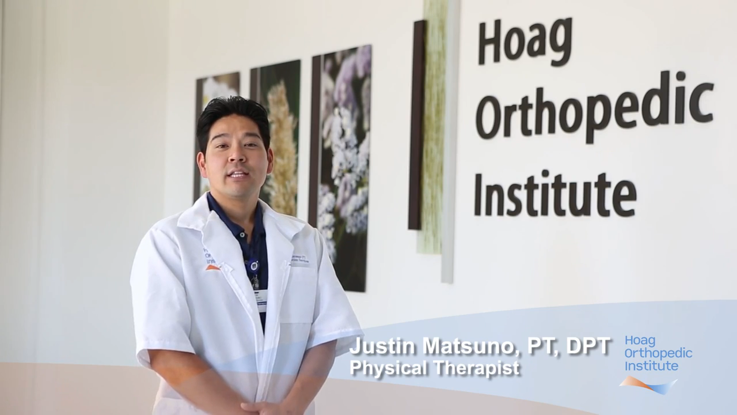Degenerative Disc Disease
Spine Surgeons in Orange County
Degenerative disc disease refers to symptoms and pain caused by the deterioration and weakening of a spinal disc that protrudes into the spinal canal. It is a condition common with aging, and results from natural wear and tear caused by physical activity on the body and components of the spine. For example, connective tissue in spinal discs can dehydrate and lose elasticity and strength as a person ages. Discs can be further weakened by daily activity that places pressure on the disc and its elastic outer layer.
When the outer ring of a spinal disc becomes weakened due to age, the inner portion can slip out of place. This is known as a herniated disc, and it is more likely to occur as a person gets older. A herniated disc can affect any part of the spine, from the neck (cervical) to the lower back (lumbar).
Degenerative disc disease (DDD) and a bulging disc can be diagnosed at the same time, leaving some patients to question the difference between these two diagnoses. Basically, degenerative disc disease is an age-related condition that often can be a contributing cause or underlying reason for a bulging disc.
Because a herniated disc can place pressure on the nerves and muscles surrounding the spine, it can create a number of symptoms that affects a person’s daily life.
Common symptoms of herniated disc include:
- Pain, numbness, and tingling
- Radiating pain extending to the arms or legs
- Pain that becomes worse with movement, standing or sitting, or at night
- Muscle weakness
At the Center for Spine at Hoag Orthopedic Institute, our spine doctors leverage a wide breadth of experience to help patients with degenerative disc disease find effective and targeted treatment for their unique condition, including herniated discs. Through accurate diagnoses made with state-of-the-art diagnostic equipment, we can identify the severity of disc displacement and the most appropriate course of treatment.
Treating Degenerative Disc Disease
Although the term degenerative disc disease may imply a serious disorder that progressively worsens over time, it can be treated effectively. In cases where non-surgical treatment does not provide relief and patients still experience severe pain and symptoms that impede their ability to work or perform daily activities, surgery may be required.
Treating degenerative disc disease and issues such as herniated, torn, or ruptured discs may vary, but will generally be performed as either minimally invasive surgery or traditional open surgery.
- Minimally invasive spine surgery – Our spine surgeons at the Spine Center at Hoag Orthopedic Institute have the ability and resources to treat degenerative disc disease and herniated discs using minimally invasive surgical techniques. Minimally invasive surgery is an alternative to open surgery, and it can be performed on an outpatient basis. Depending on the nature and severity of a condition and deterioration of a spinal disc, various minimally invasive decompression surgeries may be used, including laminectomy, fusions, laminotomy and discectomy, among others. The benefits of minimally invasive surgery include less disruption to the muscles and tissues surrounding the spine, estimated shorter hospital stays, and faster recoveries. Our specialists can help you determine if minimally invasive surgery is the right option for you.
- Traditional open surgery – Spinal fusion is a surgical procedure that permanently joins together one or more vertebrae in the spine. Open spine fusion is performed through incisions that allow access to a portion of the spine, removal of degenerated discs or portions of a disc, and use of medical hardware to connect the vertebrae being fused.
Speak With a Spine Surgeon About Your Options
The Center for Spine at Hoag Orthopedic Institute is committed to personalized care that helps patients find pain relief and improved mobility they need to lead more productive and enjoyable lives. Learn why our spine surgeons are trusted by residents throughout Orange County and why our award-winning, orthopedic-specific hospital and two surgery centers are continually recognized for our excellence.
Visit our physician directory to find a spine doctor today.
-
 Back to Driving Spine
Back to Driving Spine"Procedure: Complex Spinal Surgery Watching TV, taking long walks, getting up out of a ..."
Read More -
 Back to Enjoying Life After Spine Surgery Spine
Back to Enjoying Life After Spine Surgery Spine"Procedure: Spinal fusion Jonathan Dibiasi and his family love spending time at their ..."
Read More -
 Back to Running After Spine Surgery Spine, Sports Medicine
Back to Running After Spine Surgery Spine, Sports Medicine"“I can’t believe I’m walking, let alone running,” says car crash survivor, seven-time ..."
Read More -
 Back to Savoring Every Day Hand & Wrist, Spine
Back to Savoring Every Day Hand & Wrist, Spine"Procedures: Spinal Surgery: January 16, 2017; Right Wrist Fusion: January 12, 2018 ..."
Read More -
 Back to Painting Spine
Back to Painting Spine"Procedure : Multi-level Spinal Fusion At age 69, lifelong professional artist ..."
Read More -
 Back to Wearing Cowboy Boots Spine
Back to Wearing Cowboy Boots Spine"For two years, Sally Greer spent most of her time on her couch, and gained 130 pounds ..."
Read More -
 Back to Being Healthy Spine
Back to Being Healthy Spine"I would like to get a message to a couple of your staff members and their supervisor. ..."
Read More -
 Back to Dance After Spine Surgery Spine
Back to Dance After Spine Surgery Spine"For the past decade, Irvine aerospace engineer Shoja’s zest for life led him to grace ..."
Read More -
 Back to a Better Life Spine
Back to a Better Life Spine"I had spine surgery by Dr. Richard Lee on January 3rd. It appears to have been been ..."
Read More










